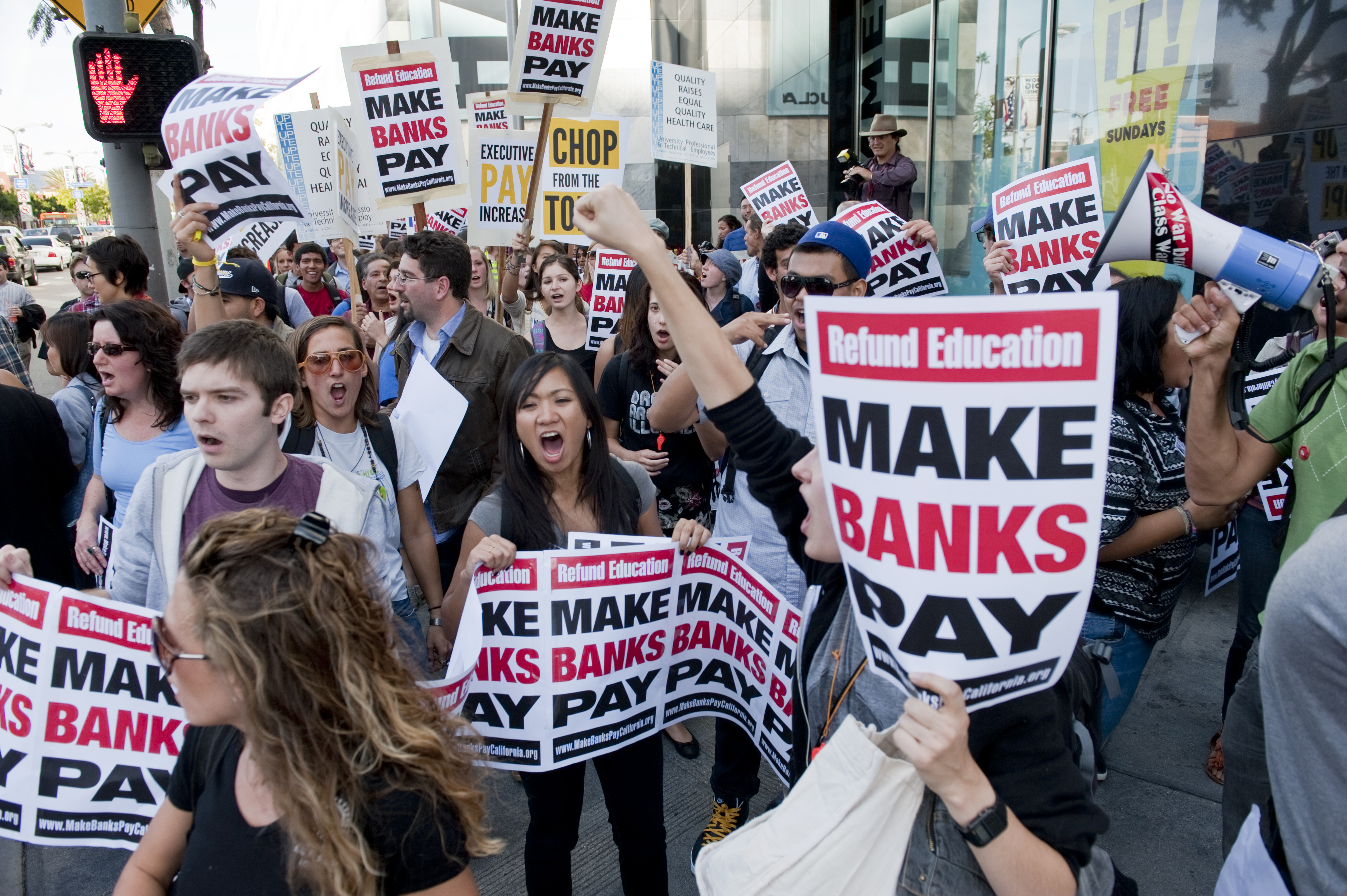

Eleven people were arrested and protesters shut down Wilshire Boulevard for two and a half hours Wednesday afternoon in the loudest pushback against tuition hikes and state budget cuts near UCLA since 2009.
The protest was linked to a broader day of action across the state of California, organized through a group called the ReFund California Coalition. The group has emerged in the wake of the Occupy protests and adopted refunding public education as its core concern.
At least seven of those arrested identified themselves as UCLA students.
A variety of groups and interests were represented at the march, which at its peak consisted of about 200 people ““ students, faculty and staff joined Occupy L.A. participants and union organizers.
Holding up signs reading “Make banks pay” and chanting, protesters departed from Bruin Plaza around 1 p.m. and marched down Westwood Boulevard. The marchers were greeted with cheers and honks from passing cars and pedestrians.
The protesters stopped at Bank of America on Westwood Boulevard and crowded around the front entrance.
Renee Hudson, a fifth-year English graduate student, and Jacob Manheim, a first-year geology student, pulled out a poster bearing the ReFund California Coalition pledge and taped it to the bank’s front door.
The list included demands for increased income taxes for wealthy Californians and a reversal of tuition increases and layoffs in the public education system.
Mathew Sandoval, a fifth-year graduate student in the world arts and cultures department, said it was important for students to forcefully raise their voices against tuition increases.
The UC Board of Regents approved a 9.6 percent tuition increase in July, and multiyear tuition increases have been floated as a solution to declining state support.
“If they raise tuition, it affects everybody,” Sandoval said.
From the bank, the protesters walked toward the intersection of Wilshire and Westwood boulevards, keeping mainly on the sidewalk. Union organizers attempted to keep the protesters in lines of two.
Then protesters marched around the four corners of the intersection and blocked traffic from all directions. Eleven people, including Hudson, sat down in a circle in the middle of the intersection.
They refused to move, even when the Los Angeles Police Department warned that arrests would be made.
Around 3 p.m., the protesters were taken into custody on charges of unlawful assembly. As of Wednesday night, they were still being held, police said.
“People sitting in an intersection doesn’t stop the whole thing from working, but if more people start doing this, we can bring (the) system to a hold,” said Jason Ball, a postdoctoral political science student who was taken into custody.
Ball and other protesters had begun the march committed to being arrested for their cause, said Cheryl Deutsch, a graduate student in urban planning who was also arrested.
Organizers voiced plans to shut down the intersection at a town hall meeting Tuesday night. Over the weekend, ReFund California Coalition announced a week of action to begin Wednesday and end the upcoming Wednesday.
Gerald Kominski, a professor of public health and associate director of the UCLA Center for Health Policy Research, signed a petition circulated by ReFund California to support the group’s goals. He said he did not agree with the arrest of the protesters.
“It is unfortunate that we’ve pushed people to a position where they have no choice, but to resort to other, more extreme ways of being heard,” said Kominski, who has taught at UCLA for 23 years. He did not participate in Wednesday’s protest.
Drivers stopped at the crosswalks initially honked in support of the protesters. But as time wore on, tensions began to surface.
One driver left her car and spoke heatedly to protest organizers, saying she was a UCLA student unable to attend class.
Manuel Gomez, a resident of East Los Angeles, missed his bus to work at Monte Vista Elementary because of the protest. Gomez said although he understood why students were protesting, it was not beneficial to shut down the streets.
“Let cars go through; people have places to go,” Gomez said. “Don’t stop them, stop the banks.”
Tessa DiPietro, a second-year art student, also came to support the protest. She said she cannot afford tuition increases.
However, she also had mixed feelings about the closure of the intersection.
“The people who couldn’t get to work today weren’t the CEOs of corporations,” DiPietro said. “It was the 99 percent that couldn’t go to work.”
